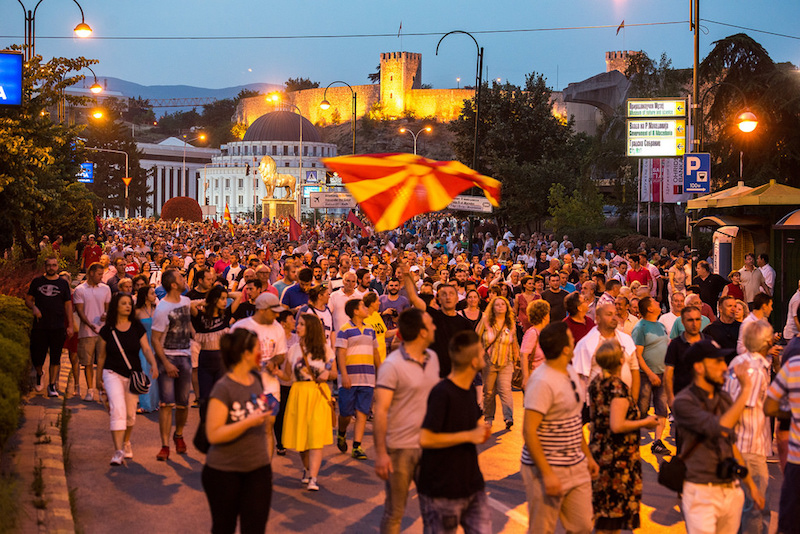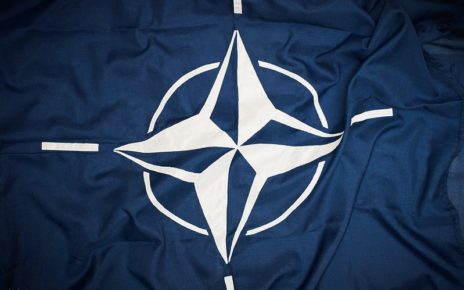Over the past year, the gradual processes of peace-building, democratization, and Euro-Atlantic integration in the Balkans has come under attack. In October 2016, Montenegro arrested Serbian nationalists suspected of collaborating with Russia to overthrow the government. In Bosnia-Herzegovina, politicians in the dominantly ethnic Serbian breakaway region of Republika Srpska have been pushing for a referendum that could tear the country apart. Meanwhile, Serbia has been reportedly expecting army fighter jets and military gear from Russia for free, an action which could deepen tensions with neighbouring states and weaken EU integration efforts.
Macedonia has long avoided these ethnic and geopolitical tensions, but is now at the centre of uncertain tensions arising in the Balkans. In 2016, after mounting protests against the corruption of Prime Minister Nikola Gruevski of the VMRO-DPMNE party, Macedonia held elections in the hopes of resolving the tension between the VMRO-DPMNE and the main opposition the Social Democratic Union of Macedonia (SDUM). The election changed little with the VMRO-DPMNE winning fewer seats in parliament and Nikola Gruevski remained in power. In the hopes of forming a new government, SDUM proposed forming a coalition with the three ethnically Albanian political parties: the Democratic Union for Integration, Besa Movement, and the Alliance for Albanians. In return for support from these parties, the SDUM agreed to make Albanian an official language once in power. Gruevski has, however, refused to relinquish power and has sparked ethnic tensions by accusing the SDUM of giving into the demands of Albanian nationalists who wish to split up the country.
While Macedonia’s political crisis may seem far removed for many countries in the Euro-Atlantic, tensions in the region pose clear risks. First, the failure of Gruevski to transfer power is a serious threat to Macedonia’s democracy. Should countries in the Euro-Atlantic fail to respond, other political leaders in the Balkans will take it as a cue that attempts to gain power through undemocratic means will face little external resistance. Second, the political crisis has given room for Russia to expand its influence in the region. Macedonia has long desired membership in the EU and NATO, but with Russian propaganda putting the two organizations in a negative light, the Macedonian public has become increasingly skeptical of Euro-Atlantic integration. This change in attitude is concerning, given the importance of Macedonia in the fight against Islamic extremism and its assistance with the refugee crisis. Third, the political crisis is taking on an increasingly ethnic dimension. Rhetoric accusing Albanians of trying to split up the country could lead to spillover into other countries with significant Albanian populations, such as Serbia and Montenegro.
To prevent exacerbation of regional tensions, countries should treat the matter seriously and prudently. This may seem evident, but recent comments from Dana Rohrabacher of the United States government’s Foreign Affairs Subcommittee on Europe stating “Macedonia is not a real country”, and should be split between Kosovo and Bulgaria, indicates otherwise. Countries should also help support free press in the region. Russia has recently begun a campaign of disinformation in the region, claiming that NATO is working with Albania to take over parts of Macedonia, or that those who support the proposed coalition are funded by American billionaire George Soros. Supporting independent media will help to counter these false accusations.
The benefits and process of Euro-Atlantic integration should be made clear. With the rise in populist rhetoric, many in the Balkans have come to see the EU and NATO more skeptically, believing that continuing reforms to join the Euro-Atlantic are fruitless. In order to correct this belief, the EU and NATO should affirm the economic and security benefits of Euro-Atlantic incorporation. Furthermore, to counter growing intolerance, the process of Euro-Atlantic amalgamation should be accelerated. This is not to suggest that the EU and NATO should neglect criteria that is necessary for accession. Rather, accession can be accelerated through financial support in order to assist countries with limited capacity to meet certain criteria. For instance, the EU has provided Montenegro with funding to meet the environmental standards required for EU accession. Even if integration was sped up for only a few countries in the Balkans, doing so would send a clear signal that accession is not closed to the Balkans, thereby encouraging these countries to continue reforms and support for the Euro-Atlantic. However, both NATO and the EU should make clear that if Gruevski fails to transfer power, Euro-Atlantic integration and the benefits that come with it will be closed to Macedonia.
Photo: Protest in Macedonia’s capital, Skopje (2016) by Vanco Dzambaski via Flickr. Licensed under CC BY-NC-SA 2.0.
Disclaimer: Any views or opinions expressed in articles are solely those of the authors and do not necessarily represent the views of the NATO Association of Canada.




